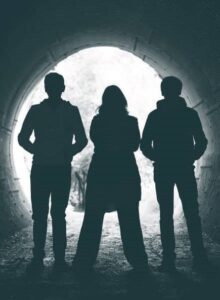
Formally known as HAPPINESS PROJECT, Limoges-based trio H/P released their debut album ‘Remove Or Disable’ in 2008. Signing to local label BOREDOMproduct, two acclaimed two long players ‘9th Heaven’ and ‘Mutation’ were released in 2012 and 2018 respectively.
Shortening their moniker, their fourth album ‘Programma’ also saw threesome eschew conventional identities, preferring to be known as F/T (lead vocals + synths), C/P (lead + backing vocals) and C/T (synths, string machine, piano, bass guitar + backing vocals). With their personas now portrayed as enigmatic shadowy figures, the focus is on the music, a glorious pop concoction of minimal synth and vintage drum machines with an elegant retro-futuristic presence and a small dose of melancholy.
With charming girl-boy vocals, stark electronic effects and an array of synthesized melodies, ‘Programma’ brings some appealing warmth and soul into what has often been considered a cold musical form. ELECTRICITYCLUB.CO.UK chatted to all three members of H/P to find out how they achieved it.
H/P had previously made music as HAPPINESS PROJECT but you have minimised in image and approach, what had prompted this change in direction?
C/T: We have a rule inside the band, we do not want to make twice the same album. Before ‘Programma’ we released two albums with BOREDOMproduct: ‘9th Heaven’ and ‘Mutation’. As you can notice our latest album before ‘Programma’ was named ‘Mutation’. So it was logical for us that something happens. We decided first to change the name of the band. So we have only kept the initials of HAPPINESS PROJECT. Then we decided to do the same work with our music and we composed new tracks in a very minimal way. ‘9 Mars’ was one of the first tracks we composed and we did it in a very minimal way. We wanted to make a true mutation but it does not mean that we dislike what we have done before, absolutely not, this is the natural evolution of a project which tries to create new things at each time.
F/T: We haven’t really minimised anything. H/P has always been a way for us to call ourselves, so it has rapidly sounded more natural to us, to use it as our permanent name for the band. As for the music, that was really our intention to make a new album with less instruments, so as to give more amplitude to the songs and maybe more space to the listener’s imagination.
Had there been any synth trailblazers that you felt inspired by in how you conceived ‘Programma’?
C/T: We had in our own background, bands that counts a lot for us, like KRAFTWERK, JOY DIVISION, NEW ORDER… but also French bands like MARTIN DUPONT, TRISOMIE 21, KAS PRODUCT… those bands take certainly a big part in our music. Of course when we were young, we discovered synth music with French artists like Jean-Michel Jarre or the band named SPACE, we were fascinated by those machines which brought brand new sounds in the pop music, it was incredible for us, we had at this period (during the 70s and the 80s) the feeling that music gave us the possibility to enter into science fiction and the future… and this is very fun to notice that today when you mention those periods or those artists you speak about the past. I think even now that electronic music is always the sound of science fiction and imaginary worlds because electronic music always sounds like something abstract and intellectual.
F/T: As far as we are concerned, we have always been inspired by musicians like KRAFTWERK or a French band from the 1970s SPACE, but also without forgetting bands like MARTIN DUPONT, KAS PRODUCT or TRISOMIE 21 (from the 1980s), and other bands like NEW ORDER, THE CURE, JOY DIVISION and IN THE NURSERY, as well.
Which vintage synthesizers did you turn to, did you have to buy, beg or borrow? Was there a dominant synth on the album?
C/T: When we compose our music in our home studio we use very classical synthesizers like Korg, Minimoog and Nord Lead ones… then we send our demos to BOREDOMproduct and for ‘Programma’, our label has used the analogue synthesizers which belong to the band CELLULOIDE. I don’t know exactly which type of synth they used but we did agree with the fact they produced our album with old synthesizers and analogue effects. The result sounds as we wanted our album to sound.
Did you set any restriction rules to help control the fun, like a limited palette of sounds and effects?
C/T: No, we had no restriction the only rule was to have an album which sounds new, minimal and not digital.
F/T: Definitely not! As we said previously, we wanted to create something which would sound more minimal, more up-to-date, which would suit the sensations we wanted to express: sensitivity, oblivion, awareness.
ELECTRICITYCLUB.CO.UK loves the sound of primitive drum machines, but why do you think they still retain a charm for electronic music enthusiasts?
C/T: Because primitive drum machines had a very personal sound, you can play with them to personalise your sound and create a singular rhythm. They always give today a true personality of a track, and they seem to be played in a very organic and natural way, you can feel the warmth of their sound when you mix them. So this is a very interesting material for the sound engineer, this is the reason why old drum machines are always used, because they are very creative machines.
Assuming that you used software and virtual instruments before in HAPPINESS PROJECT, how analogue were you able to go with H/P?
C/T: To be true, we have always used analogue in the past. If you listened to our track ‘Poupée Mécanique’, you’ll be able to hear that we have used a true Mellotron. Another track like ‘No Name’ on ‘9th Heaven’ or ‘The Pumpkin Fairy Tale’ on ‘Mutation’ were principally created with a Minimoog synth. Most of the time, we composed our electronical music without computer, only with synths and we play everything. When the track is composed in a very traditional way, then we open our computer and we put all the different musical parts on Cubase! But we play everything with our small hands 😉 We rarely use software or virtual instruments. So I think that in the future. we will keep analogue synths for H/P.
One thing that you did retain from your previous incarnation was the dual male/female vocal style, is this what ‘I Prefer Two’ is partly referencing?
C/T: Yes of course, but we still have the dual male/female vocal style. We have used it less for ‘Programma’ because of the pandemic period! We have recorded our new album during the lockdown, so it was more difficult for us to be all together at the same time in the studio. Our female voice lives in Paris. So we mostly record male voice for our new tracks because it was easier for us to do so during the pandemic, but it doesn’t mean in the future that it won’t be the contrary for our next album.
C/P: Yes, the duality is always present in our albums. Duality between female/male voices, duality between synthétic and basic instruments, between low and faster pieces, sad or more playful themes…
How would you describe the creative dynamic between the three of you?
C/P: It’s like in a couple (but we are a trio, by the way): you have to live in harmony and deal with the desires of each other. Communicate, exchange and trust in each other. We have to compose… ‘cause H/P is the result of our three personalities.
‘Les Choses’ features French but the vocals on the album are predominantly in English, while writing the lyrics, did you find you were all starting to dream in English as well?
F/T: But we have been dreaming in English for so long! In fact, most of the music we listen to, is in English and when it comes to “Synth-pop” music, English sounds more natural. But we like to insert French lyrics too… we have always been doing so (even in our previous albums). The combination between both languages is great, because they both express different feelings, different colours. English is more straightforward, French is more mysterious, sometimes.
‘The Alarmist’ has a Motorik presence, has German kosmische musik ever been an influence?
F/T: We think so! As kids, we used to listen to KRAFTWERK a lot. We were big fans, as well as TANGERINE DREAM! We still love songs like ‘Trans Europe Express’!
C/T: To go further, I can say that KRAFTWERK changed our life when we were very young ! When we discovered their music in 1978, it has opened a door in us, we were children and we were totally hypnotized by their music and by those sound, it was like a revolution at this period, I truly had the feeling that we entered in a new dimension, a parallel one as if we were entering into the future and into the past at the same time. What is very fascinating in synthesized music, there is always a mix between sounds that come from nowhere and the architecture of tracks which reminds listeners a lot of classical music… so if ‘The Alarmist’ reminds us of our musical background, it means that we have reached our purpose!
The bassline of ‘Black Tea’ is quite boisterous while the verse is almost goth, but the chorus is uplifting?
F/T: Yes, of course! Maybe, all this reflects the many musical influences we’ve had like CLAN OF XYMOX, DEAD CAN DANCE or NEW ORDER… moreover, we are very instinctive musicians and sometimes, everything comes out, at once. The creation of a song can be very spontaneous and can express different emotions, one after the other.
‘9 Mars’ begins each verse with a feminine lead, how do you decide on the vocal arrangements?
C/P: At the beginning, ‘9 Mars’ was an old track that came out on a self-produced album, sung by Christelle. It’s a very personal song and that’s why we proposed it to BOREDOMproduct, with the female lead voice.
‘Ultraviolin’ would be a great pop song in any style, what was its genesis?
F/T: ‘Ultraviolin’ is a tribute to music itself and to all the various bands who’ve had a big influence on us. This song is a way to say thank you! Music is so important to the three of us. This is what ‘Ultraviolin’ is about.
C/T: ‘Ultraviolin’ is based on a very naïve synth gimmick, a very iterative one. When we found this gimmick then we created the other parts of the track: violins, rhythm, etc. We did like traditional music made with traditional musicians, you turn around an initial theme and you build your track with this minimal material. It’s very interesting to create a track with this method, because with very few musical notes, you can build a more complex universe.
Alain Séghir of MARTIN DUPONT joins you on ‘Vicinities’ and the structure is perhaps looser than the other songs on the album?
F/T: Yes, you’re right! That was such an incredible opportunity. We’ve been fans of their music, almost since their beginning. C/T and Alain Séghir started a correspondence on Myspace… then we met at a concert in France… then we continued exchanging messages and then Alain Séghir’s contribution to ‘Vicinities’ naturally came. We didn’t impose anything… we sent him the track as it originally was and he played the bass-guitar as he did and that was perfect.
Do you have any plans to perform any of the ‘Programma’ album live or are you just happy to have created a good record?
C/P: It’s planned! We also like to share our music with our fans. Bringing it to life is a great achievement!
Will H/P continue or will there be a return to “Happiness”?
C/P: Our band is a project, always in the making, always in renewal and evolution, in a constant desire of development. We always ‘Remove Or Disable’ all that we do in order to access the ‘9th Heaven’. This is our ‘Programma’. H/P is a part of HAPPINESS PROJECT, just another facet of us.
ELECTRICITYCLUB.CO.UK gives its sincerest thanks to H/P
Special thanks to Eric D at BOREDOMproduct
‘Programma’ is released by BOREDOMproduct in vinyl LP, CD and digital formats, available from https://boredomproduct.bandcamp.com/album/programma-album
https://www.boredomproduct.fr/hp-programma/
https://www.facebook.com/hp.programma
https://www.instagram.com/hp_band/
Text and Interview by Chi Ming Lai
21st April 2022

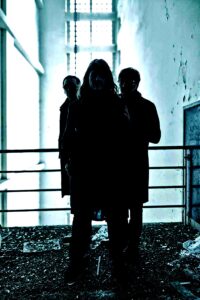
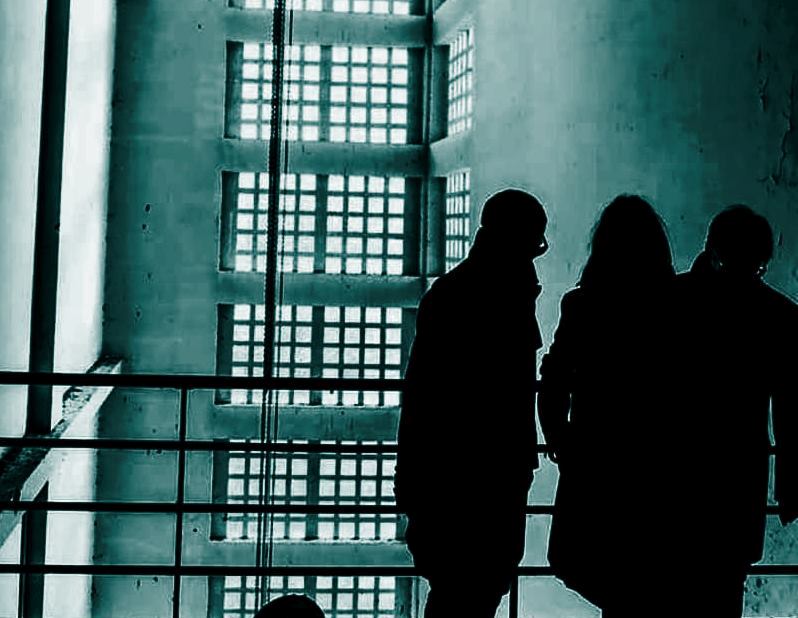
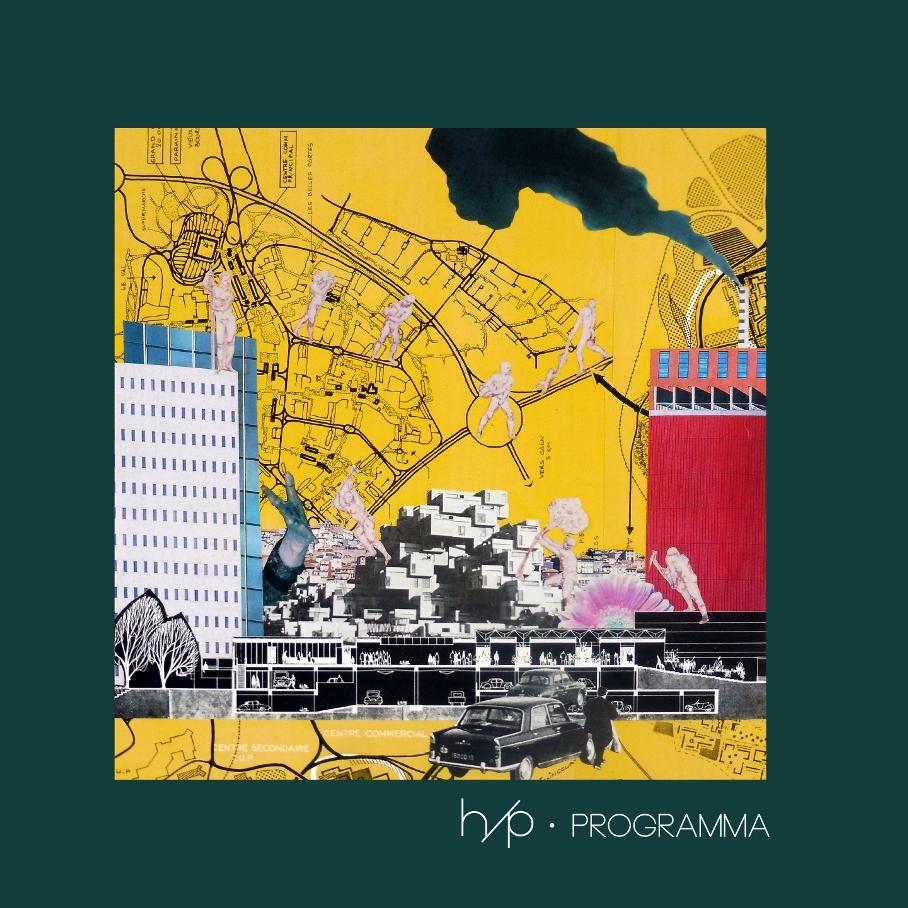
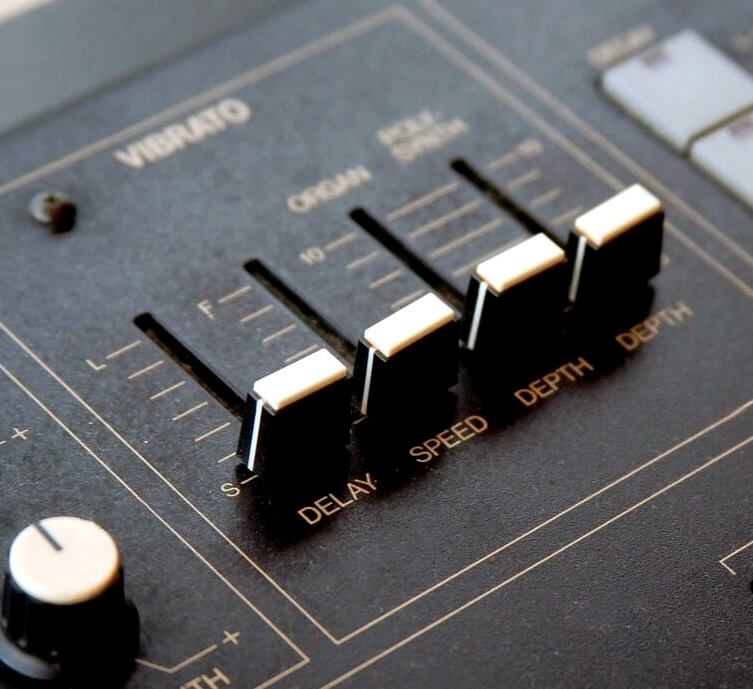
Follow Us!